|
the big queer movie list
what is this list and how does it work?
search
contact (submit a review!)
quotations
rental tips and references
who is responsible for this?
pick a category:
drama
comedy
musical
foreign language
documentary/miniseries
semi-queer
sort all categories according to your specific interests:
lesbian
gay guys
bisexual
transgender
youth
people of color
HIV/AIDS
based on books & plays
based on real people & events
coming out
families
oppression & violence
fighting the system
tearjerkers
the great pretenders
fag hags
|
unless otherwise stated, all reviews are copyright © rebecca pierson, 2003.
last updated 2.12.03. i promise there will be new stuff soon.
drama
Alive and Kicking
British, 1996, Nancy Meckler (Sister My Sister). Jason Flemyng, Antony Sher, Dorothy Tutin.
“Romantic drama about the relationship between an HIV-positive ballet dancer and a neurotic therapist.”
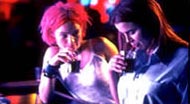 All Over Me {editor's pick!} All Over Me {editor's pick!}
1997, Alex Sichel. Written by Sylvia Sichel. Produced by Dolly Hall (The Incredibly True Adventures of Two Girls in Love, High Art, Johns, The Wedding Banquet, Longtime Companion). Alison Folland (Boys Don’t Cry), Tara Subkoff, Leisha Hailey, Pat Briggs, Wilson Cruz, Cole Hauser.
It can't be easy to make a cool movie about angsty teens without backsliding into that most repugnant of film genres, the "teen movie." The fact that "All Over Me" could very easily suck, but doesn't, is what sets it apart.
The protaganist of the film is 15-year-old Claude, a roller-skating, Patti Smith-worshipping, aspiring rock musician and who is in love with her best friend Ellen. Ellen (who has major issues with her family, her weight, and just about everything else) is more ambivalent, sometimes reciprocating Claude's feelings, sometimes scorning them. But still the girls remain close friends...until Ellen falls for Mark, a neanderthal thug who gets her hooked on coke. Claude's concern for her friend increases when she begins to suspect Mark of murdering a gay man (played by Psychotica's Pat Briggs). Then, to top it all off, Claude meets Lucy, a totally cute and interested lesbian musician (played by a deliciously pink-haired and beautiful Leisha Hailey) who forces Claude to examine her wavering loyalties to Ellen.
Set in New York City with a kick-ass soundtrack, "All Over Me" realistically evokes the painful and confusing tangle of teenage love and friendship. Claude struggles with the same questions that many of us have to deal with: whats the difference between a friend who needs you and a friend who is using you? how do you decide between betraying a friend and doing what seems to be right? how do you find the courage to come out when you live in a society that kills queers?
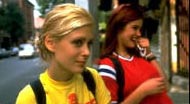 "All Over Me" is not without its faults--sometimes its hard to understand whats going on, and the dialouge is not always stellar--but the feel is right. Sichel uses mise en scene and body language to quietly emphasize the power dynamics between the characters (most notably Claude and Ellen). The casting is good too: Alison Folland is perfect as Claude, and is, in my opinion, much more attractive than the supposedly beautiful Ellen (Tara Subkoff), who totters around on platform shoes, all bony and blonde and washed-out. Leisha Hailey and Pat Briggs both turn in pretty good performances (for non-actors), and Wilson Cruz is excellent (as always) in the role of Claude's friend Jesse. "All Over Me" is not without its faults--sometimes its hard to understand whats going on, and the dialouge is not always stellar--but the feel is right. Sichel uses mise en scene and body language to quietly emphasize the power dynamics between the characters (most notably Claude and Ellen). The casting is good too: Alison Folland is perfect as Claude, and is, in my opinion, much more attractive than the supposedly beautiful Ellen (Tara Subkoff), who totters around on platform shoes, all bony and blonde and washed-out. Leisha Hailey and Pat Briggs both turn in pretty good performances (for non-actors), and Wilson Cruz is excellent (as always) in the role of Claude's friend Jesse.
Quotations
Official site
 All Over the Guy {editor's pick!} All Over the Guy {editor's pick!}
Julie Davis. Starring Richard Ruccolo, Sasha Alexander, Adam Goldberg, and Dan Bucatinsky (who also wrote and co-produced); small parts for Joanna Kerns, Lisa Kudrow (The Opposite of Sex), Christina Ricci (The Opposite of Sex) and Doris Roberts.
Review coming soon.
Quotations
Another Country
1984, Marek Kanievska. Rupert Everett (The Next Best Thing, My Best Friend’s Wedding), Cary Elwes, Colin Firth.
I haven’t been able to find this one at any video stores. If you’ve seen it, please send reviews to bibliophilebp@yahoo.com .
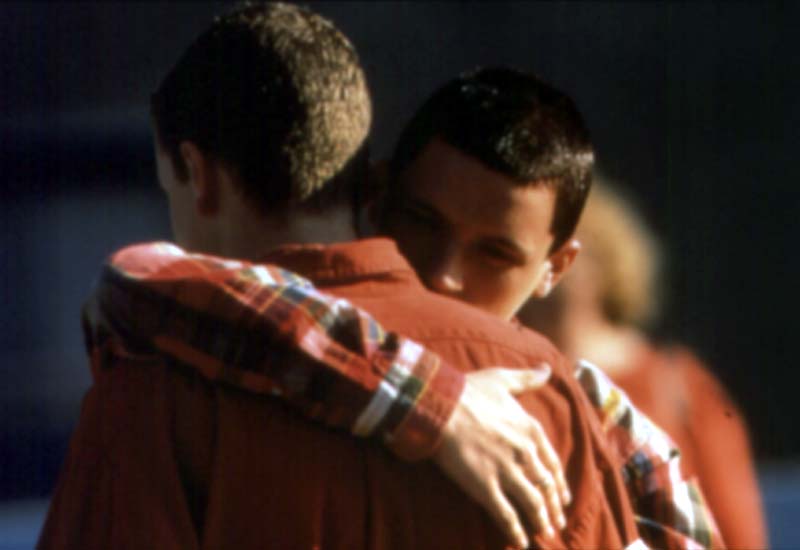 Beautiful Thing {editor's pick!}
Beautiful Thing {editor's pick!}
British, 1996, Hettie MacDonald. Screenplay (based on the stage play) by Jonathan Harvey. Starring Glen Barry, Scott Neal, Linda Henry, Tameka Epson, and Ben Daniels.
A charming coming of age/coming out story with a groovy soundtrack by the Mamas and the Papas. Set in the working-class suburbs of London, "Beautiful Thing" focuses on Jamie and Ste, two high school boys who simply yet surprisingly find themselves falling in love. Ste is athletic and outwardly "normal," but is afraid to come out to his abusive father and brother. Jamie, on the other hand, is the sort of boy who knows that Eleanor Parker played the Baroness in "The Sound of Music" (and subsequently gets called a "queer bent bastard" at school), but is still afraid to come out to Sandra, his tough-talking barmaid mum. Completing the cast are the characters of Tony, Sandra's rather useless boyfriend who doesn't understand the difficulties in her life, and Leah, the black girl next door with a drug problem and an overpowering obsession with Mama Cass.
The heavy British accents can be difficult to understand if you're not familiar with them, but besides that, "Beautiful Thing" comprehensively captures the exhilaration, fear, shame, and joy that comes with first love.
Official site.
Also check out this fan site with a handy translation guide to British slang.
Quotations
Beefcake
Canadian, 1999, Thom Fitzgerald (The Hanging Garden). Daniel MacIvor, Josh Peace, Joe Dallesandro.
Part fiction, part documentary, about the thinly-veiled homoeroticism of 1950’s physique magazines.
Before Night Falls
2000, Julian Schnabel. Javier Bardem, Andrea Di Stefano, Olivier Martinez, Johnny Depp (Ed Wood), Hector Babenco (Kiss of the Spider Woman), and Sean Penn.
Based on the memoirs of Cuban writer Reinaldo Arenas. "Before Night Falls" tells the story of Arenas’s life in Castro’s Cuba, his struggles as a writer and a homosexual (neither of which were looked upon kindly by the regime), his experiences in prison, and his eventual escape to America via the Mariel boatlift. Although the movie is excellent (especially the Oscar-nominated performance of Javier Bardem) and beautifully filmed, it is still rather confusing: the actors speak both Spanish and English (there are subtitles), and the scenes wherein Arenas imagines what could happen are difficult to distinguish from the scenes depicting what actually happens. I’d recommend reading the book first in order to better understand the film.
Bent
1997, Sean Mathias. Clive Owen, Lothaire Bluteau (Orlando, Urbania), Ian McKellan (Six Degrees of Separation, Gods and Monsters, Tales of the City), Mick Jagger.
The film’s beginning will seem a little confusing to anyone not familiar with the treatment of homosexuals in Nazi Germany, but it’s easy enough to grasp the main story: two male prisoners fall in love in a concentration camp. The whole of the film has a sort of surreal quality running through it, be it Mick Jagger playing a German drag performer or what is, quite possibly, the screen’s only sex scene that involves no physical contact whatsoever. With it’s abrupt ending and subtext of shame, I’d only recommend this movie to avid film geeks or macabre history buffs such as myself.
Official site
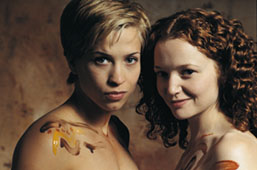 Better Than Chocolate Better Than Chocolate
Canadian, 1999, Anne Wheeler. Karen Dwyer, Christina Cox, Wendy Crewson, Peter Outerbridge.
Not massively meaningful, but fun, engaging, and sexy. Touches on a lot of issues—censorship, parent/gay child relationship, transgenderism…but more importantly {wicked grin} the leading ladies are righteous babes! (Of course, my favorite character was Frances, the geeky, uptight bookseller.)
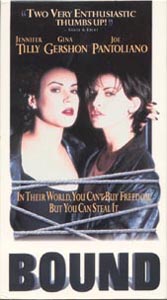 Bound
Bound
1996, written and directed by the Wachowski Brothers. Jennifer Tilly, Gina Gershon, Joe Pantoliano.
No, it’s not about bondage. It is about a butch ex-con and an seductive Mafia moll who become lovers and hatch a plan to screw the mob out of lots of money. Although it contains some pretty explicit sex and violence, the whole thing is stylishly put together; the complex plot twists and offbeat humor only add to the overall coolness of this slick suspense flick.
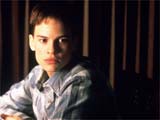 Boys Don’t Cry {editor's pick!} Boys Don’t Cry {editor's pick!}
1999, Kimberly Pierce. Produced by Christine Vachon (Hedwig and the Angry Inch, Velvet Goldmine, Kiss Me Guido, I Shot Andy Warhol, Stonewall, Postcards From America, Go Fish, Swoon, Poison). Starring Hilary Swank (who won a much-deserved Oscar for the role), Peter Saarsgard, and Chloe Sevigny (If These Walls Could Talk 2). Alison Folland (All Over Me) is also featured in a small part.
One of the most affecting films I’ve seen, ever. The true story of Brandon Teena (formerly Teena Brandon, a biological female) who leaves the trailer park and moves to Falls City, Nebraska, where he begins his ill-fated love affair with Lana Tisdel, as well as his friendship with the two men who would ultimately murder him. Be prepared for some rather harsh scenes of sexual violence and nudity, and also be prepared to be surprised by your own reaction to it. (Everyone I know who has seen this movie “freaks out” in some way afterward. I, for instance, starting sobbing in the theater lobby, clinging to my girlfriend and telling her how glad I was that she was alive; a friend of mine felt the need to go and get drunk; and my sister hugged me and my girlfriend and said she wanted to “slather” us with affirmation.) Despite the grim story, the film makes a strong point about the realities of love and gender, and conveys an ultimate message of hope. That might sound trite, but.....dammit, just see the movie.
The Boys In The Band
1970, William Friedkin (Cruising). Based on the stage play by Matt Crowley.
The first Hollywood film to focus on gays. I haven’t been able to find this one on video—if you have, please send reviews to bibliophilebp@yahoo.com .
Boys On The Side
1995, Herbert Ross. Starring Whoopi Goldberg (The Color Purple), Mary Louise Parker (Fried Green Tomatoes, Longtime Companion), Drew Barrymore. Cameo by the Indigo Girls.
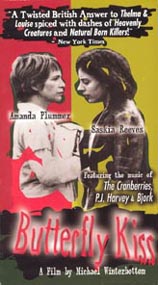 Butterfly Kiss
Butterfly Kiss
British, 1995, Michael Winterbottom. Amanda Plummer, Saskia Reeves.
A window into insanity that will basically destroy your will to live. The story of a meek gas station attendant, a chain-wearing psychopath, and the road trip/love affair that quickly turns murderous. Although the final scene (set to the Cranberries’ “No Need to Argue”) is gut-wrenchingly beautiful, the majority of “Butterfly Kiss” is violent, choppy, and frightening—the ultimate feel-bad movie.
Carrington
1995, Christopher Hampton. Jonathan Pryce, Emma Thompson.
Yawn. A film about writer Lytton Strachey and his relationship with painter Dora Carrington. And that’s all I remember before falling into the narcoleptic coma. (If you’re interested in real narcoleptic comas, see “My Own Private Idaho.”)
The Children’s Hour
1962, William Wyler (Ben-Hur), black & white. Audrey Hepburn, Shirley Maclaine.
A child’s misinterpretation mutates into a scandal for teachers Hepburn and Maclaine. One of the old-school Hollywood homo movies—the picture ain’t over till the queer bites the dust.
Chuck and Buck
2000, Miguel Arteta. Chris Weitz, Beth Colt, Lupe Ontiveros, and Mike White (who also wrote the screenplay).
The fact that this movie is trying to be funny only makes it seem more creepy and disturbing. After the death of his mother, Buck (who seems to embody the theory of homosexuality as arrested development) becomes obsessed with his childhood friend Chuck. Unlike Buck however, Chuck has managed to grow up, get a job, and form a relationship (with a woman). Buck’s stalking of Chuck isn’t darkly comic—its just twisted and pathetic. The only reason I’d recommend watching this movie is for it’s visual style—unusual camera angles and lighting emphasize make the film look both gritty and glowing, emphasizing Buck’s childlike simplicity and his crumbling sanity.
Claire of the Moon
1992, Nicole Conn.
I’ve got to agree with reviewer Judith Halberstam’s suggestion for this film: “Give it an award for Worst Non-Action Film with No Sex, No Effects, and No Clue. Give it two.” The story of a slutty straight chick, an uptight therapist dyke, and the hate-into-love relationship that develops between them when they are forced to share a cabin at a women’s writing retreat. By today’s standards, the movie is pretty tame and the stars are kinda skanky. I don’t know how this movie earned its status as a “lesbian classic,” but somehow it did, and for that reason alone, you should probably watch it at least once, and get it over with.
The Color Purple
1985, Steven Spielberg. Danny Glover, Margaret Avery, Oprah Winfrey, Whoopi Goldberg (her first film).
An unfortunately bowdlerized version of Alice Walker’s Pulitzer-winning novel. The loving and passionate lesbian relationship between Celie and Shug is portrayed as simply a close friendship in the movie, and the sexuality is toned down to nothing but a small kiss (followed, of course, by the old camera-pans-to-the-window trick). Read the book instead.
Common Ground
2000, Donna Deitch. Made for cable TV (Showtime network).
Eric Stoltz, Brittany Murphy, Jason Priestley, Helen Shaver, Margot Kidder, Brian Kerwin (Torch Song Trilogy), Mimi Rogers, Jonathan Taylor Thomas, Steven Weber (Jeffrey), Scott McCord, Dan Lauria, Edward Asner (More Tales of the City), James Le Gros, Andrew Airlie, Beau Bridges, Harvey Fierstein.
“Common Ground” is actually three different films, all set in the same small Connecticut town.
The first part, “A Friend of Dorothy,” is written by Paula Vogel, and takes place in the 1950’s. Brittany Murphy stars as a returning WAC who is hampered in civilian life by her Section 8 (dishonorable) discharge. Murphy is alluring, as always, yet her performance is dwarfed not only by the by Jason Priestley’s appalling attempt at a Southern accent, but also by the weakness of the plot itself. The whole thing seems rushed and unreal. Even the kiss between Murphy’s soldier-girl and a sexy, androgynous lesbian feels contrived. Which is a shame, since that kiss is pretty much the highlight of “Common Ground.”
The second part, “M. Roberts,” is quite a disappointment, considering that it was written by award-winning playwright Terrence McNally (Love! Valour! Compassion!). McNally’s screenplay is set in the 1970’s, and focuses on gay high-school student and his closeted teacher. The abuse faced by Jonathan Taylor Thomas’s teenage character is portrayed with cruel realism—a sharp, painful contrast to the heavy-handed dialogue and awkwardly happy ending. Like the rest of “Common Ground,” “M. Roberts” has an important point to make, but fails to make it convincingly.
The third and final part, “Amos and Andy,” which takes place in the present day, was penned by another gay playwright, Harvey Fierstein (Torch Song Trilogy). This third story finally succumbs to the TV-movie cheesiness that the others tried so hard to avoid: it ends with the film’s narrator (Eric Stoltz) attending a gay wedding and imagining all the characters from the previous sections sitting there with him. Gag me. However, by not taking itself too seriously, “Amos and Andy” also contains some of the funniest parts in the whole film: the father-son bickering between Ed Asner and James Le Gros. Le Gros’s rant about gays becoming too “normal” is amusing and right on the money, but it seems displaced in a “plea-for-acceptance” film like this one. Of course everyone comes around in the end (gay guys, lesbian surrogate moms, and baby makes five) with yet another solution too glib for believability.
The overall tone of “Common Ground” is one of pandering, as if trying to compensate for being about queers by overdosing on “good old-fashioned American values.” Argh. If this is “normal,” I can see why gay people—or any people—wouldn’t want it.
Quotations
Cruising
1980, William Friedkin (Boys in the Band). Al Pacino (Dog Day Afternoon).
A film about a murderer in the gay s/m community that provoked many a protest due to it’s violent portrayal of queer life.
The Crying Game
1992, Neil Jordan (Interview with the Vampire).
Defying Gravity
1998, John Keitel. Daniel Chilson, Nicklaus Lange, Don Handfield.
This movie should have been subtitled “Boyfriend In A Coma.” Pete, a college student, has been gay-bashed and lies comatose in a hospital bed. His closeted frat-boy lover, John “Griff” Griffith, must decide if he should tell the police that he was with Pete just before the attack (thereby outing himself), or just keep quiet and let the attackers get away with it. What is a boy to do?
“Gravity” tries very hard to be realistic and sincere, but succeeds only during its moments of simplicity and silence. There are touches of realism, but the cheesy dialogue, underdeveloped characters, melodramatic storyline (who gay-bashed Pete? will Griff find the courage to come out?), and low-budget video filming gave this movie the distinct feel of an after-school special. Its the kind of video you might watch in your high school freshman health class, if homosexuality was actually covered.
Like many of the other films from Wolfe Video, this movie is tame as far as sex is concerned—we’re told that the boys are lovers, but all we see is one a shirtless embrace and a paltry amount of kissing. (Like I said, after-school special.) This movie isn’t bad...it is just slow-moving and largely unremarkable.
Desert Hearts
1986, Donna Deitch (Common Ground).
The “landmark lesbian film” based on Jane Rule’s novel, Desert of the Heart. Despite its supposed popularity, I haven’t been able to find this one at any local video places or libraries, so I can’t tell you if it deserves its “dyke classic” status, or falls into the “Claire of the Moon” category of overrated yawn-fest. If you’ve seen it, please send reviews to bibliophilebp@yahoo.com
 Edge of Seventeen Edge of Seventeen
1998, David Moreton. Chris Stafford, Anderson Gabrych, Tina Holmes, Lea Delaria (Further Tales of the City).
Another film about an adolescent boy coming of age! Wooo!
Okay, so “Edge of Seventeen” isn’t your usual feel-good growing-up movie: the adolescent in this film happens to be queer. But as a queer, his story is, unfortunately, far from unusual.
“Seventeen” is the story of Eric, a New Jersey high school student, and his metamorphosis from questioning hetero to full-fledged homo. Coming out as a teenager is an excruciating and often pathetic process, and director Moreton is merciless about evoking all those uncomfortable memories. It’s almost painful to watch Eric making horrible mistakes, fucking up royally and not even realizing it until too late. I actually found myself yelling at the screen, things like “No, don’t do it, you’ll regret it!” or “You moron, it’ll never work!” Eric stumbles through situations that most queers can relate to: having to lie about your sexuality; screwing up a friendship with a straight love interest; breaking your mother’s heart; coming out to your best friend; flirting with your first same-sex love interest, etc. Actor Chris Stafford makes Eric’s tension and awkwardness seem dangerously real—so much so that it makes the viewer wince, re-living those unsure, fumbling moments of being so young and so newly-awakened. There’s one scene in particular, when his best friend asks him an important question, and he acts all tortured and cold and the friend has to say “what?!?!” about fifty times before he answers with “I’m sorry, but…” I’ve been on both sides of such an exchange, and it’s neither one is pretty.
“Edge of Seventeen” has some impressive performances, most notably that of lesbian comic/actor/singer Lea Delaria, who is fabulous as Eric’s bulldyke mentor. The film is also rather explicit scenes—no full frontal nudity or anything like that, but the sex scenes are very frank (not recommended for mommy, daddy, or the little kiddies).
I didn’t exactly like this movie—I was especially irritated by the ending, all the nice people who still had hurt feelings, and the lessons Eric still hadn’t learned from them—but I loved it’s 1980’s setting. To me, it was worth seeing just for the rad 80’s fashions and cool New Wave soundtrack. (I wonder why I’m so attracted the 80’s? Perhaps I should go back into therapy.)
Edward II
1991, Derek Jarman. Steven Waddington, Andrew Tiernan, Tilda Swinton.
This modernization of Christopher Marlowe’s classic play involves gay rights demonstrators, nude gymnasts, and Annie Lennox singing a Cole Porter tune. Very, very, fucked up.
Even Cowgirls Get The Blues
1994, Gus Van Sant. Uma Thurman, Rain Phoenix, Lorraine Bracco, John Hurt, Angie Dickinson, with cameos by Roseanne, River Phoenix, and William Burroughs(!). From the Tom Robbins novel.
The queerest part, (besides Hurt’s “arch-decadent” Countess) is the love story between cowgirl Bonanza Jellybean and giant-thumbed hitchhiker/female-hygiene-product model Sissy Hankshaw. Pretty fucked-up, and weirdly-paced—just when I thought it had reached the dramatic watershed, the place where things would begin to happen, it ended. I can’t say I really liked this movie, but I do really like the name ‘Bonanza Jellybean.’
Finding North
1998, Tanya Wexler. Wendy Makkena, John Benjamin Hickey (Love! Valour! Compassion!), Angela Pietropinto.
Another one I haven’t been able to find. If you’ve seen it and have an opinion, please share: write bibliophilebp@yahoo.com .
Fire
1996, Deepa Mehta. Shabana Azmi, Nandita Das.
I haven’t been able to find this one at the video store or library, but I really want to see it because I’ve heard it’s very good. (Again, if you have seen it, please send reviews to bibliophilebp@yahoo.com .)
Flawless
1999, Joel Schumacher. Robert DeNiro, Philip Seymour Hoffman (The Talented Mr.Ripley, Magnolia, Almost Famous), Daphne Rubin-Vega (Wild Things).
Review coming soon.
Official site.
Fried Green Tomatoes
1992, Jon Avnet. Kathy Bates, Jessica Tandy, Mary Louise Parker (Longtime Companion, Boys on the Side), Mary Stuart Masterson.
Another classic lesbo novel turned into an afraid-to-say-it movie. Other than that, the movie is pretty good. But still, read the book (by Fannie Flagg, who has a small role in the film as well).


Get Real {editor's pick!}
British, 1999, Simon Shore. Ben Silverstone, Brad Gorton, Charlotte Brittain. Based on the stage play “What’s Wrong with Angry?” by Patrick Wilde.
I’ll admit, I’m a sucker for gay British boys—like the ones in this film about an unlikely romance between a skinny gay loner and a handsome jock who also happens to be Head Boy of the high school they both attend. “Get Real” is a fairly honest look at the difficulties of being young and queer: how hard it can be to keep love in the closet, how coming out becomes necessary to maintain your sanity, and how coming out does not always result in happy-ending acceptance. (This is reflected especially in Steve’s speech near the end of the film —its like the realistic version of the big “I’m gay!” group affirmation speech at the end of “In & Out.”)
The film focuses primarily on the romance between the two boys, and I’ve got to say that the main character, Steve, seems far more attractive to me than his supposedly studly loverboy John. Steven is gangly and sweet (I especially love his adorable smile and pointy canine teeth), while John seems to wear a constant grimace, with a harsh mouth and smarmy wet-curl hair. His closet-case character isn’t exactly likeable either—he’s got a nasty habit of denying his boyfriend one second, and professing love the next.
Besides the boys, there is an impressive cast of supporting characters, the star of which is Linda, Steven’s best friend. While the character might be a somewhat stereotypical fag-hag, it is hard not to appreciate her healthy sense of humor about the nonsense of being a teenager. The affectionately catty banter between Linda and Steve is one of the best things in the movie.
I’ve heard some people criticize “Get Real” for using the same cliches that one finds in straight coming-of-age love stories. But I think that this movie’s the use of such cliches is part if its genius, a way of conveying the message that whether you’re straight or gay, “growing up” and falling in love, etc, is still going suck. All things considered, I think “Get Real” strikes a good balance between idealistic comedy and truthful coming-of-age drama. Even the bittersweet ending evokes the curious exhilaration of being newly out—that delirious, liberated, first-love feeling, when it was daring and exciting simply to hold your significant other’s hand. In a subculture where it’s all too easy to become jaded and “gayed out,” movies like this are a necessary reminder of that initial sense of discovery. Extra bonus: the Troggs song, “Love is All Around,” playing in the background of a pick-up scene in a public toilet. That, and Steve’s Dad making model Daleks ;-)
Official site.
Check out bensilverstone.net for translation guide to British slang.
Quotations
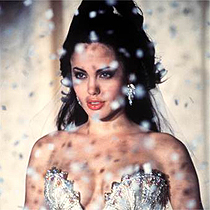 Gia: The Tragic Story of a Supermodel
Gia: The Tragic Story of a Supermodel
Michael Cristofer. Angelina Jolie (Foxfire), Faye Dunaway, Mercedes Ruehl, Elizabeth Mitchell.
If Angelina Jolie was standing naked in my front hallway begging me not to leave, I certainly wouldn’t get on the elevator. Full review coming soon. (If you’re really interested in the real life of Gia Carangi, I recommend the biography by Stephen Fried.)
Quotations
Glen or Glenda?
1953, Edward Wood, black & white. Starring Bela Lugosi, Ed Wood.
Part B-movie horror, part cautionary tale, and part plea for understanding, this movie about transsexuals will likely leave you more confused than shocked. Try Tim Burton’s “Ed Wood,” to gain a (somewhat) clearer understanding.
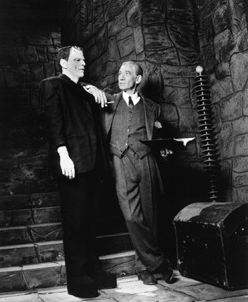 Gods and Monsters Gods and Monsters
1998, Bill Condon. Lynn Redgrave (The Next Best Thing), Ian McKellan (Bent, Six Degrees of Separation), Brendan Fraser.
Based on the true story of the last days of “Frankenstein” director James Whale. McKellan is perfect as the aging Whale, all white hair and blue eyes, winking at the pretty young men. And Fraser proves himself to be a real actor, honestly portraying the insecurities of a failed tough-guy. Ostensibly the plot is about the relationship that develops between Whale and his gardener, but the underlying message is one of memory and identity, death and creation. Some ingenious lighting and camera techniques make the viewer examine how they perceive people, and where our monsters really come from.
Official site
 Go Fish {editor's pick!}
Go Fish {editor's pick!}
1994, Rose Troche, black & white. Produced [with Tom Kalin] by Christine Vachon (Hedwig and the Angry Inch, Velvet Goldmine, Kiss Me Guido, I Shot Andy Warhol, Stonewall, Postcards From America, Swoon, Poison). Guinevere Turner (Kiss Me Guido, The Watermelon Woman), V.S. Brodie, Migdalia Melendez, Anastasia Sharp, T. Wendy McMillan.
The story of Max (“you know, Max, like Where the Wild Things Are”), “a carefree single lesbo, looking for love,” and what happens when her friends attempt to set her up with the shy and unattractive Ely. The brief fantasy sequences are both amusing (the various friends each imagine their own version of a seduction scene) and insightful (when one of the women sleeps with a man, she imagines a crowd of lesbians interrogating her and questioning her sexuality.) There are some beautiful, artfully filmed scenes (the cooking/sex scene being my personal favorite) and a brilliant bit of dialogue concerning alternate terms for “vagina.” This is one of my all-time favorite movies, and Guinevere Turner is one of the most beautiful women on the face of the earth.
Quotations
The Hanging Garden
1997, Thom Fitzgerald (Beefcake). Chris Leavins, Kerry Fox, Seana McKenna.
One hell of a weird film, and I’m not entirely sure why. Perhaps it’s too much like “real life,” in that it reminds us just how tangled and fucked-up “real life” can be. The premise: gay prodigal son comes home for the first time in ten years to watch his sister marry his old boyfriend in the garden where the son once tried to hang himself. The plot moves on from there, dealing with the strange manifestations of the past as the family tries to reconcile themselves to the future. Strange is the key word in describing this film, and I can’t decide whether that’s good or bad. The garden motif and the haunting Irish music give the movie an eerie calm, a strange (there it is again) poetic sort of feel. All in all, though, I’d have to say that my personal favorite part of this film is the character of Violet, an androgynous little tomboy who runs around cursing and wearing a backwards purple baseball cap. Now who does that remind me of? ;-) Official site
Head On
Australia, 1998, Ana Kokkinos. Alex Dimitriades, Paul Capsis, Julian Garner.
Official site
High Art
1997, Lisa Cholodenko. Produced by Dolly Hall (The Incredibly True Adventures of Two Girls in Love, Johns, The Wedding Banquet, Longtime Companion). Radha Mitchell, Patricia Clarkson, Ally Sheedy.
Review coming soon.
The Hunger
1983, Tony Scott. Catherine Denueve, David Bowie (The Man Who Fell To Earth), Susan Sarandon (Rocky Horror Picture Show).
The old lesbian vampire bit. Denueve insisted on a body double for her sex scene with Susan Sarandon, causing straight men and lesbians everywhere to doubt Ms. Deneuve’s sanity. Prepare to be a little freaked-out and perplexed by the ending.
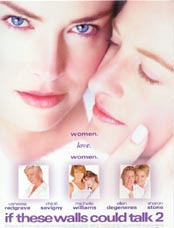  If These Walls Could Talk 2 {editor's pick!}
If These Walls Could Talk 2 {editor's pick!}
2000, Jane Anderson, Alex Sichel (All Over Me), Anne Heche (Wild Side). Vanessa Redgrave (Wilde, Prick Up Your Ears), Chloe Sevigny (Boys Don’t Cry), Michelle Williams (But I’m A Cheerleader), Ellen DeGeneres, Sharon Stone (Basic Instinct).
Review coming soon.
In the Flesh
1997, Ben Taylor. Ed Corbin, Dane Ritter, Philip Solomon.
Haven’t seen it yet.
It’s My Party
1996, Randal Kleiser. Eric Roberts, Margaret Cho (I’m The One That I Want), Marlee Matlin, Devon Gummersall, George Segal, Olivia Newton-John, Bronson Pinchot, Gregory Harrison, and a bunch more.
A gay man with AIDS decides to commit suicide rather than let the virus kill him slowly....but not before throwing a huge goodbye party for everyone in his life.
I Shot Andy Warhol
1995, Mary Harron. Produced [with Tom Kalin] by Christine Vachon (Boys Don’t Cry, Hedwig and the Angry Inch, Velvet Goldmine, Kiss Me Guido, Stonewall, Postcards From America, Go Fish, Swoon, Poison).Lili Taylor.
Seeing as it’s centered around Andy Warhol’s famed “Factory,” the film contains a colorful cast of minor queer characters, including the transvestite actress Candy Darling. (But the guy who plays Warhol in this film doesn’t hold a candle to David Bowie’s portrayal in “Basquiat.”)
I've Heard the Mermaids Singing
Patricia Rozema (When Night Is Falling).
Coming soon.
Just Like A Woman
British, 1995, Christopher Monger. Based on the book Geraldine by Monica Jay. Julie Walters (Sister My Sister, Billy Elliot), Adrian Pasdar.
This is one of those films that is queer without being homosexual. “Just Like A Woman” is mainly a hetero love story, with a queer twist: the male romantic interest, Gerald, is a transvestite. I like the idea of this movie—after all, most people don’t know that many cross-dressers are heterosexual, and the difference between gender identity and sexuality is something that the cinema has only just begun to address—but I found the actual movie itself to be rather tedious. The cheesy 80’s look and bad synth music didn’t help, and even the talents of Walters and Pasdar (who is quite pretty—he looks kind of like a young Tony Curtis) couldn’t redeem the totally implausible ending. Despite its commendable message and skillful performances, “Just Like A Woman” is ultimately a mediocre movie.
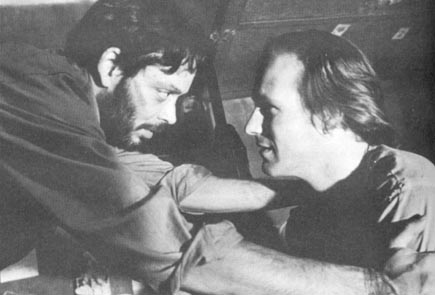 Kiss of the Spider Woman {editor's pick!}
Kiss of the Spider Woman {editor's pick!}
1985, Hector Babenco. Based on the novel by Manuel Puig. William Hurt, Raul Julia, Sonia Braga.
One of my favorite movies, as well as one of the first gay movies I ever saw. William Hurt won an Oscar for Best Actor—the first person to win one for a gay role. Full review to come.
Lianna
1983, John Sayles.
I can’t seem to find this one anywhere. If you’ve seen it, please send reviews to bibliophilebp@yahoo.com .
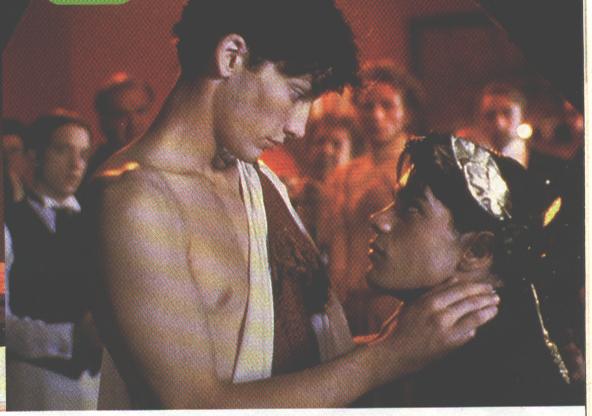 Lilies {editor's pick!} Lilies {editor's pick!}
Canadian, 1996, John Greyson. Adapted from the play “Les Feluettes” by Michel Marc Bouchard. Matthew Ferguson, Danny Gilmore, Jason Cadieux, Aubert Pallascio, Alexander Chapman, Brent Carver.
Coming soon.
The Living End
1991, Gregg Araki (Nowhere, Totally Fucked Up). Craig Gilmore, Mike Dytri, Darcy Marta.
A film about gay guys, AIDS, and anger. In his usual disturbing fashion, Araki describes this film as “mostly set on the road. It’s like a Hope/Crosby movie....in which Crosby fucks Hope.”
Longtime Companion
1990, Norman Rene. Produced by Dolly Hall (All Over Me, The Incredibly True Adventures of Two Girls in Love, High Art, Johns, The Wedding Banquet). Bruce Davison, Campbell Scott, Brian Cousins, Mary Louise Parker (Fried Green Tomatoes, Boys on the Side).
Reviewer Jenni Olson sums it up nicely: “Nine years in the lives of a group of gay men living in New York City, from the onset of the AIDS crisis in 1981 to the present.” About as interesting as it sounds. This film is often credited as one of the first of a fairly recent genre—the “AIDS movie.”
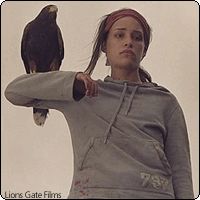 Lost and Delirious {editor's pick!}
Lost and Delirious {editor's pick!}
Canadian, 2001, Lea Pool. Piper Perabo, Jessica Pare, Mischa Barton, Jackie Burroughs (More Tales of the City). Based very loosely on The Wives of Bath by Susan Swan.
Normally, I’m annoyed by movies that don’t allow their queer characters to survive—it makes us seem so pathetic, and it reinforces the idea that homosexuality is something that must be punished—but there are exceptions to this rule. “Philadelphia” is one; so is “Boys Don’t Cry”; and now I’m adding “Lost and Delirious” to that list.
This film is one of the most beautiful, intense, and sad depictions of teenage love I’ve ever seen. (And I don’t use this kind of hyperbole lightly.) The story might not be original—a boarding-school romance—but the beauty of setting and the absolutely raw, gut-wrenching performance of Piper Perabo are quite enough to redeem this film. The tone is like that of A Separate Peace, or "Dead Poet’s Society," only with girls; and instead of war or poetry, love is the driving force. I cried three times while watching this movie, it reminded me so much of the brutal emotions of first love: the guilt of lying to your loved ones; the pain of that first betrayal; the feeling that you absolutely cannot go on living if that one person doesn’t love you. Piper Perabo gives an amazing performance, making a difficult character not only believable, but emotionally immediate as well. When she sobs, you remember all the times you’ve sobbed as though your heart was literally breaking; and when she leaps on a table in a crowded library and begins speaking the “reverberate hills” passage from “Twelfth Night” to her lover, you wonder how any girl could ignore so impassioned a plea.
Again, my apologies for the gushing hyperbole of this review, but something in this film brings it out.
Extra bonus: FENCING!!! I loooove fencing.
 Love! Valour! Compassion! {editor's pick!} Love! Valour! Compassion! {editor's pick!}
1997, Joe Mantello. Stephen Bogardus, Justin Kirk, John Glover (in double roles as twins), Randy Becker, Stephen Spinella, John Benjamin Hickey (Finding North), Jason Alexander.
From the play by Terence McNally, with the original cast (except for Nathan Lane, whose role is aptly taken over by Jason Alexander).
Quotations
Making Love
1982, Arthur Hiller. Michael Ontkean, Harry Hamlin.
One of the first Hollywood films to deal with gay men coming out and (surprise!) not hating themselves. I haven’t been able to find this one, so if you’ve seen it, please send reviews to bibliophilebp@yahoo.com .
The Man Who Fell To Earth
1976, Nicholas Roeg. Buck Henry, David Bowie (The Hunger).
This film could be considered queer in a couple of ways. First of all, Buck Henry’s character is incidentally gay—that is, they never say it outright, but it’s perfectly obvious. Second, Bowie (who is red-haired and hella sexy, even if he is way too skinny) plays an alien, and is therefore entitled to mess about with human gender roles. However, I wouldn’t really recommend this film to anyone but hard-core Bowie devotees or fans of trippy 1970’s science fiction—it’s really long (two and a half hours) and really difficult to understand. And just so you're warned, there is full frontal Bowie.
Maurice
British, 1987, James Ivory. James Wilby, Hugh Grant (Bridget Jones' Diary), Ben Kingsley (Twelfth Night).
Film version of E.M. Forster’s posthumously published gay novel. It’s too bad Hugh Grant isn’t a fag in real life, he does it so well. Full review coming soon.
M. Butterfly
1993, David Henry Hwang. Jeremy Irons, John Lone.
Psychological drama about race, gender, love, and truth.
The Monkey's Mask
Coming soon.
Quotations
Mullholland Drive
2002, David Lynch. Naomi Watts, Laura Elena Harring, Justin Theroux, Ann Miller, cameo by Billy Ray Cyrus. Aspiring actress Betty and amnesiac Rita fall in love as they attempt to make their way through a dark and disturbing Hollywood. Visually intriguing but otherwise confusing, this film is basically two and a half hours of Lynch’s usual fucked-up surrealism.
 My Beautiful Laundrette {editor's pick!}
My Beautiful Laundrette {editor's pick!}
British, 1986, Stephen Frears (Prick Up Your Ears). Gordon Warnecke, Daniel-Day Lewis, Saeed Jeffrey, Derrick Branche, Roshan Seth, Rita Wolf, Shirley Ann Field.
Contains one of the greatest scenes in queer cinema: the Lick. Review coming soon.
Quotations
My Own Private Idaho
1991, Gus Van Sant (Even Cowgirls Get the Blues). Keanu Reeves, River Phoenix.
The Next Best Thing
2000, John Schlesinger (Sunday Bloody Sunday). Madonna, Rupert Everett (My Best Friend’s Wedding, Another Country), Ileana Douglas, Lynn Redgrave (Gods and Monsters).
Madonna and Rupert as a straight girl/gay guy unit who “accidentally” (don’t ask me how, I haven’t seen it yet) conceive a child, and try to form a family unit. Soundtrack featuring Madonna’s remake of “American Pie.”
Nowhere
1997, Gregg Araki (The Living End, Totally Fucked Up). James Duval, Rachael True, Kathleen Robertson, Christina Applegate, Ryan Philippe (Cruel Intentions), Heather Graham, John Ritter, a bunch of other people.
The usual Araki crap. Except less gay this time.
Official site.
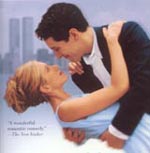 The Object of My Affection The Object of My Affection
1998, Nicholas Hytner. Paul Rudd, Jennifer Aniston, John Pankow, Alan Alda, Nigel Hawthorne, Tim Daly. Based on the novel by Stephen McCauley.
A gay man and a straight woman attempt to form a family when the woman finds herself pregnant. The book does a better job at addressing the complexity of the relationship between the two main characters, but it tends to get a little dreary and slow. The movie, on the other hand, has a faster pace and a lighter tone, and even though it’s not quite as realistic as the book, it’s sweet, and yes, even cute. And Jennifer Aniston is actually good in it.
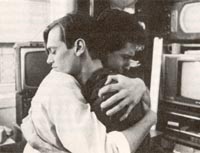 Parting Glances {editor's pick!}
Parting Glances {editor's pick!}
1986, Bill Sherwood. Richard Ganoung (Billy’s Hollywood Screen Kiss), John Bolger, Steve Buscemi, Kathy Kinney.
Critics often hail this as a great film in its own right, and gay critics point out that it’s one of the first films that presupposes homosexuality. Takes place within twenty-four hours in the life of Michael, who is dealing with the impending departure of his noncommittal lover, Richard, as well as the deteriorating health of his HIV-positive ex-lover/best friend, Nick. An unusual role for Steve Buscemi, but he pulls it off beautifully—they all do.
Quotations
Personal Best
1982, Robert Towne. Mariel Hemingway (The Sex Monster), Patrice Donnelly.
So. Two female track stars (one gay, one straight) train for the Olympics. They have an affair. Straight girl moves on to victory and heterosexuality, dyke gets left in the dust. The sex scene is the highlight of the film, and that’s not saying much. A film to avoid.
Philadelphia {editor's pick!}
1994, Jonathan Demme. Tom Hanks, Denzel Washington, Antonio Banderas (Interview With The Vampire).
Tom Hanks won an Oscar for the role of Andrew Beckett, a gay lawyer who takes a powerful law firm to court after they fire him for having AIDS. Despite all the hype this movie got, it actually is quite good. “Philadelphia” contains fine performances, interesting cinematography, and most importantly, a moving and affective story.
Poison
1991, Todd Haynes (Velvet Goldmine). Produced by Christine Vachon (Boys Don’t Cry, Hedwig and the Angry Inch, Velvet Goldmine, Kiss Me Guido, I Shot Andy Warhol, Stonewall, Postcards From America, Go Fish, Swoon).
Postcards From America
Produced by Christine Vachon (Boys Don’t Cry, Hedwig and the Angry Inch, Velvet Goldmine, Kiss Me Guido, I Shot Andy Warhol, Stonewall, Go Fish, Swoon, Poison).
Stream-of-consciousness crap. Only watch it if you really dig art films.
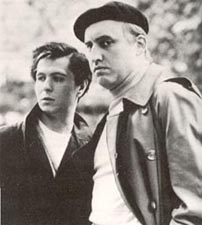 Prick Up Your Ears
Prick Up Your Ears
British, 1987, Stephen Frears (My Beautiful Laundrette). Gary Oldman, Alfred Molina, Vanessa Redgrave (If These Walls Could Talk 2, Wilde).
The true story of British playwright Joe Orton and his lover Kenneth Halliwell, based on the biography by John Lahr. Molina gives an excellent performance as Kenneth—the crazier Kenneth gets, the more Molina looks like Marlon Brando in “Apocalypse Now.” It is creepy. (Oh, and yes, the dirty pun in the title is intentional.) Rather dreary fare, if you’re not interested in Joe Orton or the seedy side of gay life in 1960’s Britian. There are some rather amusing scenes, such as a grandmother transcribing some of the dirty shorthand in Orton’s diaries, or the obscene little stories that Orton and Halliwell write on the dust jackets of library books (although I must admit, the librarian in me just wanted to fix the jackets).
Quotations
Relax, It’s Just Sex
1998, written and directed by P.J. Castelanetta. Jennifer Tilly (Bound), Mitchell Anderson, T.C. Carson, Lori Petty, Serena Scott Thomas, Cynda Williams (Tales of the City), Billy Wirth.
Review soon.
Serving in Silence: the Margarethe Cammermeyer Story
1994, John Korty (telefilm), 1995, Jeff Bleckner.
Glenn Close, Judy Davis. Review coming soon.
Sister My Sister
British, 1994, Nancy Meckler (Alive and Kicking). Screenplay by Wendy Kesselman based on her book My Sister in This House. Joely Richardson, Jodhi May, Julie Walters (Billy Elliot, Just Like A Woman), Sophie Thursfield.
Insanity, murder, and lesbian incest. A psychoanalyst’s dream. Why do people like to make movies about killer dykes? (Complete review coming later.)
Six Degrees of Separation
1994, Fred Schepisi. Will Smith, Stockard Channing, Donald Sutherland (Tales of the City), Ian McKellan (Bent, Gods and Monsters, Tales of the City).
Slaves to the Underground
1996, Kristine Peterson. Molly Gross, Marisa Ryan.
Aargh. Another one I haven’t been able to find. Please send reviews to bibliophilebp@yahoo.com .
Stonewall
1995, US/UK, Nigel Finch. Co-produced by Christine Vachon (Boys Don’t Cry, Hedwig and the Angry Inch, Velvet Goldmine, Kiss Me Guido, I Shot Andy Warhol, Postcards From America, Go Fish, Swoon, Poison). Guillermo Diaz, Frederick Weller, Brendan Corbalis.
Please send reviews to bibliophilebp@yahoo.com .
 The Sum of Us The Sum of Us
Australian, 1994, Kevin Dowling. Jack Thompson (Midnight in the Garden of Good and Evil), Deborah Kennedy, John Polson, and a pre-“Gladiator” Russell Crowe.
The movie version of David Stevens’s play about a young gay man, his widowed father, and how their close family relationship effects their romantic relationships. A quirky film about queer family life with a serious twist near the end. (Complete review coming later.)
Quotations
Sunday Bloody Sunday
British, 1971, John Schlesinger (The Next Best Thing). Peter Finch, Glenda Jackson, Murray Head.
Review very soon.
Swoon
1991, Tom Kalin (co-producer of Go Fish, I Shot Andy Warhol), black & white. Produced by Christine Vachon (Boys Don’t Cry, Hedwig and the Angry Inch, Velvet Goldmine, Kiss Me Guido, I Shot Andy Warhol, Stonewall, Postcards From America, Go Fish, Poison).
In 1924, a pair of lovers named Nathan Leopold and Richard Loeb kidnapped and killed a young boy to prove their intellectual superiority. This artful (if sometimes confusing) film focuses on the relationship between the two lovers, in a “clever, troubling fiction about history, homophobia, ecstasy, and murder.” (For more fun with Babe and Dickie, check out Hitchcock’s “Rope.”)
Threesome
Josh Charles, Stephen Baldwin, Lara Flynn Boyle.
Ugh. Don’t let the your menage a trois curiosity get the best of you. This movie is two hours of your life you’ll never get back.
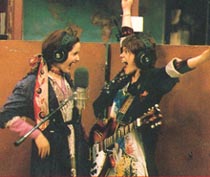 Times Square
Times Square
1980, Allan Moyle (Pump Up the Volume). Robin Johnson, Trini Alvarado, Tim Curry (Rocky Horror Picture Show).
This movie is apparently not available on video anymore, and I’m not sure if it ever was. But if you come across it, either on video, or at a film festival or whatever, please let me know (e-mail bibliophilebp@yahoo.com )—this movie has become a sort of Holy Grail to me. I do have the soundtrack record though, which kicks quite a lot of ass: its got Patti Smith, Lou Reed, Gary Numan, the Cure, Talking Heads...all kindsa good stuff.
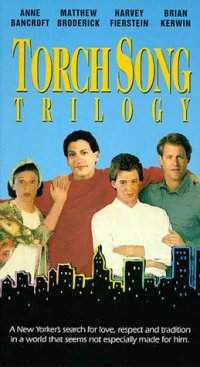 Torch Song Trilogy {editor's pick!} Torch Song Trilogy {editor's pick!}
1988, Paul Bogart. From the stage play by Harvey Fierstein. Starring Fierstein, Brian Kerwin (Common Ground), Anne Bancroft, Matthew Broderick (Election), Eddie Castrodad, Ken Page.
Watch it with someone you love—you’ll need a hand to hold and (if you get all emotional about movies the way I do) a shoulder to cry on. But it’s a really good movie. See it. One of the more touching parts, for me at least, is the scene where Arnold talks to his brother about thier parents, how much they love each other what great parents they’ve been, and how “it kills me to think that they look at me and wonder what they did wrong.”
Quotations
Total Eclipse
1995, Agnieszka Holland. David Thewlis, Leonardo DiCaprio.
Avoid this one unless you’re a really big fan of these actors, or the poets they portray (Paul Verlaine and Arthur Rimbaud). This film features lots of absinthe, but not much plot. Pretty much the only thing I got out of it was this fun fact: British authorities used to administer rectal exams to find evidence of homosexuality (which was a criminal activity at the time).
Totally Fucked Up
1994, Gregg Araki (The Living End, Nowhere). James Duval.
Okay, I haven’t seen this one, but this time its not just because I can’t find it—its also because Araki’s films annoy the fuck out of me. If you happen to be an Araki fan and wish to defend the director, you may do so by e-mailing bibliophilebp@yahoo.com .
Urbania
2000, Jon Shear. Dan Futterman, Alan Cumming, Samuel Ball, Matt Keeslar, Lothaire Bluteau (Orlando, Bent). Written by Shear and Daniel Reitz, based on Reitz’s play “Urban Folk Tales.”
Ever since his lover was murdered suddenly on the street, Charlie hasn’t been able to sleep properly. This grief-induced insomnia sends Charlie on a surreal nighttime odyssey to find his lover’s killer, and on the way he collects urban legends from the people he meets. Although most of the film is dark and disturbing (especially towards the end), there are some lighter moments, such as when Charlie yells at an obnoxious straight couple for “flaunting [their] lifestyle,” or his brief visit with his sick friend Brett (played by the brilliant and sexy Alan Cumming). Depressing and even tedious at some points, “Urbania” is still a fascinating film that raises some interesting points about gay people, violence, death, and letting go.
Quotations
Official Alan Cumming site, because I love Alan Cumming.
The Velocity of Gary
1998, Dan Ireland. Thomas Jane, Salma Hayek, Vincent D’Nofrio. Ethan Hawke (Reality Bites) is also featured in a small role as a tattoo artist.
The film starts out fast and interesting, then deteriorates—understandable from a realistic viewpoint, but hardly interesting as entertainment. D’Nofrio is Valentino, an HIV+ porn star. Hayek is Mary Carmen, his lover, the centerpiece of his life—that is, until a handsome stranger named Gary (Jane) comes along. Gary’s role in the lives of Valentino and Mary Carmen starts out as that of a distraction, slowly becoming a best friend, and ending up as a caretaker (perhaps this is the velocity to which the title refers?) The movie contains one scene that stood out especially, a very sexy scene in which the camera focuses on the faces, rather than the bodies, of the two men as they kiss passionately (a refreshing touch, considering that too often in entertainment, gay men are either over-sexualized or made into eunuchs). This film also proves that the “doomed transvestite” theme is alive and well, in the form of a young deaf drag queen, who lip-synchs to Patsy Cline and then gets hit by a car. (The bad lip-synching continues later in the film, when Hayek dresses up as Diana Ross.) There’s a fair amount of weird imagery (a lost dog searching for his master, kinky vampire stuff), but it’s really up to the individual viewer to decide if this film is brilliant or just bizarre and depressing.
Velvet Goldmine
1998, Todd Haynes (Poison). Produced by Christine Vachon (Boys Don’t Cry, Hedwig and the Angry Inch, Kiss Me Guido, I Shot Andy Warhol, Stonewall, Postcards From America, Go Fish, Swoon, Poison). John Rhys-Meyers, Ewan McGregor, Christian Bale, Toni Colette.
A film about glam rock that’s rather like glam rock: it’s starts out glittery and compelling, falls into a sort of divine decadence, and then just keeps going....and going....and going....but it’s not a bad film if you’ve got the attention span. Seen through the eyes of a young gay journalist, the story is supposedly fictional, but any moron can tell that the two main characters (played by McGregor and the devastatingly beautiful Rhys-Meyers) are supposed to be Iggy Pop and David Bowie. (Did Bowie and Iggy Pop have a sexual relationship? I’ve only heard rumors about Bowie and Mick Jagger....) The creepy thing is that McGregor, with his hair all bleach-blond and stringy, looks so much like Kurt Cobain it’s not even funny. (Of course, it doesn’t help any that his character’s name is Curt.) “Velvet Goldmine” is eye candy, if nothing else. Bonus: Oscar Wilde credited as the first pop culture star.
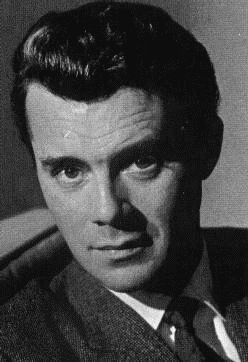 Victim {editor's pick!}
Victim {editor's pick!}
British, 1961, Basil Dearden. Black & white. Dirk Bogarde, Sylvia Sims.
The first film to have a homosexual protagonist. Although it seems tame by today’s standards, at the time it was a bold political statement about British laws against homosexuality and how they enabled blackmail. Dirk Bogarde is foxy ;-)
 The Watermelon Woman {editor's pick!}
The Watermelon Woman {editor's pick!}
1996, written, directed by, and starring Cheryl Dunye. Guinevere Turner (Go Fish, Kiss Me Guido, Chasing Amy).
A Black lesbian filmmaker searches for the history of a black actress from the 1930s, discovers that the actress was having an interracial lesbian affair, and then has one herself. Complete review coming soon.
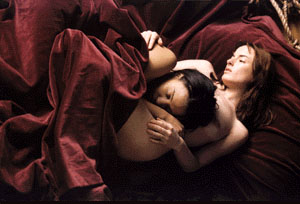 When Night Is Falling When Night Is Falling
1995, Patricia Rozema (I’ve Heard the Mermaids Singing).
Please send reviews to bibliophilebp@yahoo.com
Official site.
Wilde
British, 1997, Brian Gilbert. Stephen Fry, Jude Law (The Talented Mr. Ripley, Midnight in the Garden of Good and Evil), Vanessa Redgrave (If These Walls Could Talk 2, Prick Up Your Ears) Michael Sheen, Tom Wilkinson.
A true (and mostly historically accurate) account of the rise and fall of infamous Irish playwright Oscar Wilde. The performances in this film are superb: Stephen Fry becomes Oscar Wilde. The sweetest character, however, goes to Michael Sheen, as Robby Ross, Wilde’s literary executor and first (male) lover. Sheen is adorable as the devoted Robby, who goes on loving Wilde (silently) even after Wilde has fallen for the haughty and beautiful Lord Alfred Douglas (played to a T by the gorgeous Jude Law). The film is sprinkled with authentic Wilde witticisms like: “The things that go on in front of works of art are really appalling; the police should interfere,” or “I find that alcohol, when taken in sufficient quantities, can produce all the effects of drunkenness.” In addition to quotes like these, the film also gets to use lots of quaint little colloquialisms for homosexuals; words like “poof,” “bugger,” “sodomite” and (my personal favorite) “bum-boy.”
Official site.
|